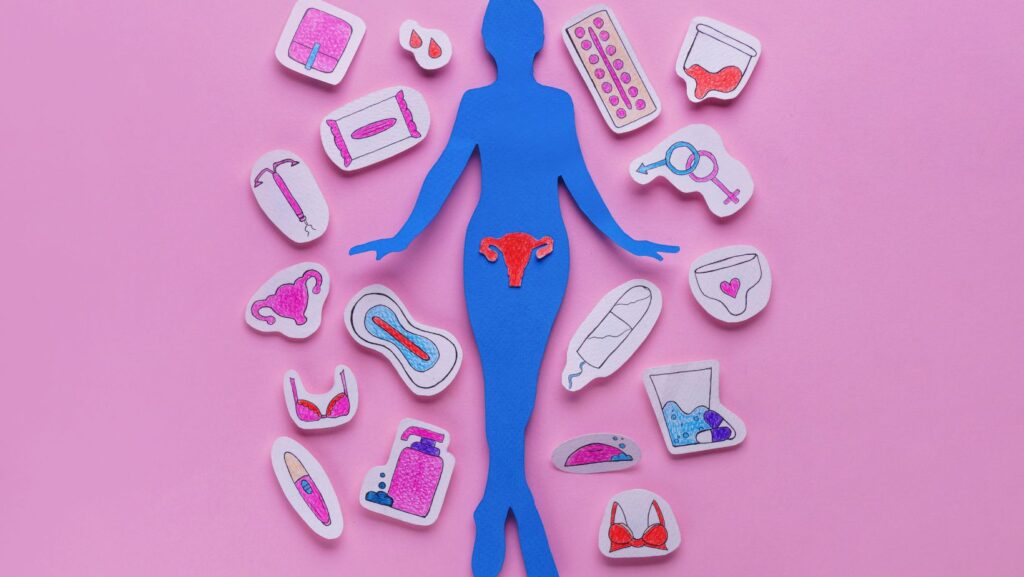You’ve been through the maze of birth control options and finally decided on the intrauterine device (IUD) for its convenience and effectiveness. But now you might be wondering, can I still get my period with an IUD?
FLO menstrual vitamins can help to provide relief from periods, so you can enjoy comfort and ease even during that time of the month. This is your guide to IUDs and menstrual cycles to demystify common questions about your IUD.
What Is an IUD?
An IUD is a small, T-shaped device inserted into the uterus to prevent pregnancy. There are two main types: hormonal and non-hormonal.
Hormonal IUDs release progestin to thicken cervical mucus and inhibit sperm movement, while non-hormonal IUDs use copper to create an environment toxic to sperm. Both types are over 99% effective at preventing pregnancy and are long-term contraceptive options, lasting from three to 10 years, depending on the type.
Exploring Menstruation on an IUD
So, can you still get your period with an IUD? The answer is a resounding yes, but the experience may vary. With hormonal IUDs, many individuals may experience lighter or even no periods over time.
 On the other hand, copper IUDs are not known to affect the regularity of periods but may lead to heavier or more painful menstruation for some. Incorporating essential nutrients like B vitamins, magnesium, and vitamin D and supplements in your diet can help alleviate common PMS symptoms while on an IUD.
On the other hand, copper IUDs are not known to affect the regularity of periods but may lead to heavier or more painful menstruation for some. Incorporating essential nutrients like B vitamins, magnesium, and vitamin D and supplements in your diet can help alleviate common PMS symptoms while on an IUD.
The IUD and Your Menstrual Cycle
Hormonal IUD users may notice changes in their menstrual cycle after insertion. Some may experience lighter periods, irregular spotting, or even no periods at all, which can be a welcome relief for those dealing with heavy or painful menstruation.
However, irregular bleeding or spotting can occur in the first few months after insertion as your body adjusts. Non-hormonal IUDs, specifically copper IUDs, typically do not affect the regularity of periods.
You can expect your menstrual cycle to continue as usual, although some individuals report heavier bleeding and more intense menstrual cramps with a copper IUD in place. It’s essential to keep track of any changes in your period while using an IUD and consult your healthcare provider if you have concerns about your menstrual health.
Debunking Myths About IUDs and Periods
When it comes to IUDs and periods, misinformation often abounds. It’s time to set the record straight and debunk some common myths. One prevailing myth is that IUDs stop your period altogether. While hormonal IUDs can lead to lighter or absent periods for some individuals, periods often do not cease entirely.
Secondly, some believe IUDs cause infertility, but rest assured, fertility typically returns promptly once removed. Lastly, the misconception that IUDs can get lost in your body is unfounded, as IUDs have strings that allow for easy removal by healthcare providers.
Managing Period Symptoms With an IUD
Managing period symptoms while on an IUD is a crucial aspect of maintaining your overall well-being. For individuals experiencing heavier periods with a copper IUD, incorporating practices like heat therapy, staying hydrated, and practicing relaxation techniques can help alleviate discomfort.

On the other hand, if you’re dealing with irregular spotting or lighter periods with a hormonal IUD, ensure you’re getting sufficient PMS vitamins, like magnesium, calcium, and vitamin E. These ingredients can aid in managing mood swings and bloating.
Navigating Unique Period Experiences
It’s essential to recognize that everyone’s period experience with an IUD is individual, with variations in flow, pain levels, and cycle regularity. If you find your periods are irregular or more painful than usual, don’t panic.
It’s common for your body to take time to adjust to the presence of an IUD. However, persistent severe pain, unusual bleeding patterns, or concerns about your menstrual health should prompt a conversation with your healthcare provider.
Navigating Periods With an IUD — Embracing Variations and Wellness
Understanding your body and menstrual health is key to a positive experience. While IUDs can impact your periods, it’s essential to stay informed, track changes in your menstrual cycle, and seek guidance from healthcare professionals when needed.
Whether you’re enjoying lighter periods with a hormonal IUD or managing a heavier flow with a copper IUD, remember that your experience is valid and unique. Empower yourself by taking charge of your menstrual health, being proactive in managing period symptoms, and advocating for your well-being.
Your menstrual health is a vital component of your overall wellness, so listen to your body, prioritize self-care, and don’t hesitate to seek help when needed. Embrace the changes, celebrate your body’s resilience, and continue on your journey toward informed decisions and optimal health.
